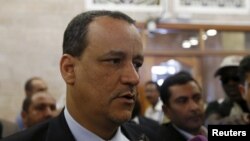Bombs from a Saudi-led air offensive continued to fall across Yemen on Thursday, as the United Nations' envoy to the country scrambled to get its warring, marginalized and exiled factions around a negotiating table in Geneva later this month.
Renewed optimism about peace talks emerged this week after representatives for exiled President Abdu Rabu Mansour Hadi and the Houthi militia indicated they might participate. This followed months of repeated failures by the United Nations to mediate a truce since Houthi rebels entered the capital, Sana'a, in late 2014 in a bid for greater political say.
Stéphane Dujarric, spokesman for the U.N. secretary-general, said the envoy to Yemen, Ismail Ould Cheikh Ahmed, was in the region trying to rally support for negotiations.
"Talks about talks are complex," he said. "I think it is clear from our end we want people to come to Geneva without any preconditions. I think we're getting there."
The goal, he said, is "to restart the political process, and to find light at the end of this horrendous tunnel in which the Yemeni people are now."
Earlier this week, the U.S. State Department confirmed that veteran diplomat Anne Patterson had traveled to the Gulf to meet separately with Hadi and with representatives of the Houthis. The militia controls the Yemeni capital after the president fled to Saudi Arabia. It remains unclear whether the United States played a role in moving the parties toward the negotiating table.
Former US Ambassador to Yemen Stephen Seche said that while U.S. support for Saudi Arabia's anti-Houthi air campaign showed "loyalty and friendship" between Washington and Riyadh, the United Nations is essential to getting Yemen on the reform track, following the 2011 uprising that led to a change in power, and working on a more politically inclusive and diverse constitution.
"If we can get the parties to agree on the cessation of the hostilities, then the U.N. can come back into Yemen, and probably, working very closely with the Yemeni political establishment, try to restart the original kind of framework of negotiations and reform processes that were so important in 2012 and 2013, and even early 2014" in the National Dialogue Conference. he said. The objective is "movement toward a kind of a new redrafting of the constitution that will recognize new political parties, new resources and a new alignment of political influence in the country — and that includes what the Houthis clearly will bring to the table at this point."
The Geneva meeting is tentatively set for June 14, but as of Thursday, the United Nations could not confirm it.
VOA's U.N. correspondent Margaret Besheer and Alhurra reporter Nabil Abi Saab contributed to this report from New York; VOA's Mohamed Elshinnawi contributed from Washington.









